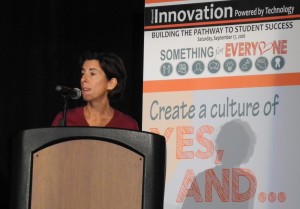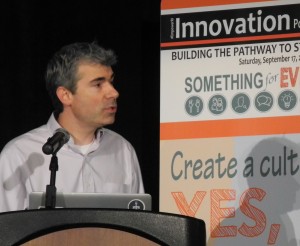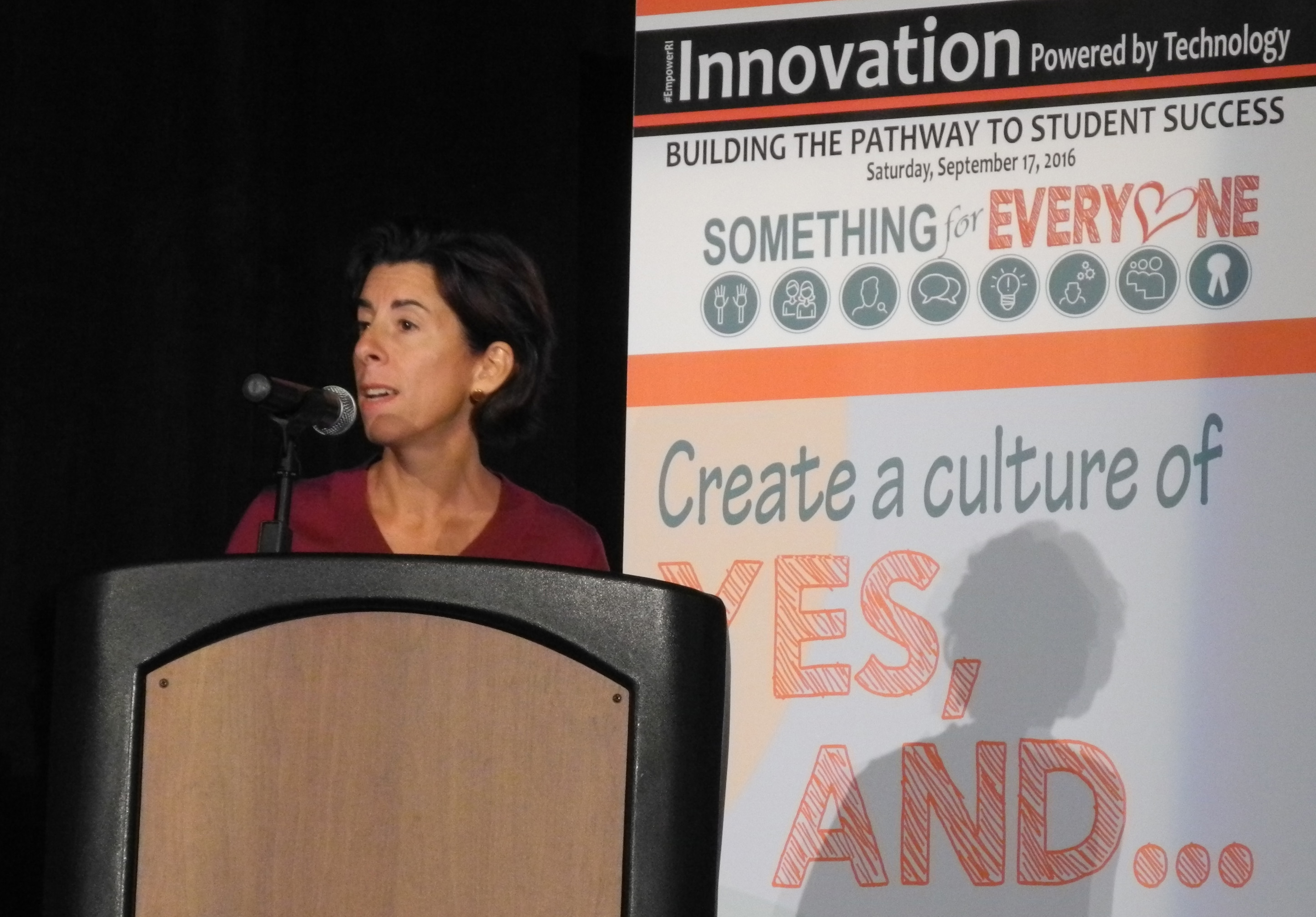
Hundreds of educators, school administrators, and students came together at the RI Convention Center today for the fifth annual “Innovation Powered by Technology” conference, sponsored by the RI Dept. of Education. Across dozens of small discussions, panels, and demos, participants from all across the state had the chance to share best practices, learn about innovations, and build community. A detailed program is available and the day’s events were captured in a rich Twitter stream.
Two of the highlights were back-to-back talks just after lunch, featuring Gov. Gina Raimondo on her perspective on technology in the state’s education system, and a high-energy presentation on personalized learning by Rhode Island’s chief innovation officer, Richard Culatta.
Gov. Raimondo began by expressing thanks for Rhode Island’s cadre of outstanding educators, “People like yourselves who are always willing to learn more, do more, be on the cutting edge for our kids. And technology is core to that. Technology gives us a direct connection to how our students think, act, work, and communicate. The smarter we can be about technology, the better we’ll be able to teach and deliver education.”
She acknowledged the challenges that our education system faces. “The thing that most keeps me up at night,” Raimondo said, “is making sure that every Rhode Islander has the skills and education they need in order to get a good job in this economy. This economy is, in many ways, scary. It has more risk than it ever had, it’s more dynamic than its ever been, and requires a higher degree of skill and education than ever in order to be successful. 70-plus percent of all good jobs in Rhode Island require some degree past high school, but only about 40 percent of Rhode Islanders have that. So every child that’s in our K-12 system right now, it’s on us to make sure that they get the skills that they need in order to be successful.”
“That is the thing that I think will turn Rhode Island’s economy around,” Raimondo continued. “Businesses are going to want to be here if we have a skilled talent base.”
The Governor talked about some of the successes of the past two years.
“We are rolling out the CS4RI program. People are raising their hands, schools, teachers, principals, students, at a faster rate than we expected, we’re ahead of all of our goals. And I’m proud that Microsoft chose Rhode Island — we’re the only state where they’re doing a statewide rollout.”
“We also have rolled out the Advanced Coursework Network and PrepareRI to make sure that every high school student in a public school can take college-level courses for college credit for free. In some ways, this isn’t a new program, but instead of $200 a class, it’s free. That’s what it’s all about: taking away what might seem like a small barrier and having a massive impact. if you can get a semester of college under your belt for free in high school, that can change your life.”
“We’re working as hard as we can to get P*Tech off the ground, thank you to Westerly and Rogers, and we’re talking about it with Woonsocket High School and PCTA. I was down in Westerly two weeks ago, and it is so exciting talking to these young people. I said, ‘Why did you sign up for P*Tech?’ and they all had an answer. I was so impressed. Ninth graders telling me, ‘Because I think it will give me an opportunity.’ They know all about it, and they were psyched to be in the program.”
A reporter from RI Future had the chance to follow up with Raimondo to ask just how significant these kinds of expanding digital efforts are in attracting companies like PayPal to the state.
“Very important,” Raimondo said. “The primary reason to do it is because these kids deserve a chance to be successful, and a good education is what is necessary. But it’s very important. I have many conversations with companies looking at coming to Rhode Island, and they ask me, ‘What are you doing, Governor, to make sure that ten or 15 years from now, we have a skilled pipeline of people that have computer skills?’ They don’t want to just know about RIC, CCRI, URI, and today’s graduates, they want to know, if we come to Rhode Island, if we are going to be there for twenty years, are you building a pipeline.”

Richard Culatta was hired in the new role of Chief Innovation Officer in January, after working in the US Department of Education office of Educational Technology, and he has clearly hit the ground running on the issue of personalized learning, which he discussed in a rapid-fire talk.
“Nobody says we shouldn’t adapt learning to the students,” said Culatta. “But the challenge is, how do we do that? What tools are necessary? What do we need?”
“As a teacher, I knew I was teaching to the middle and that the schedule was trumping my kids. Imagine for a second, if we said every student in our system, every student in Rhode Island, will have 100% mastery; what will be flexible is the time and the approach used to get there.”
“Do you need technology to personalize learning? No. Unless you want to do it at scale.”
“If you have a classroom with 3 or 4 or 5 students, well, at that point, you can do a heck of a lot of personalizing, tailor very much to their needs without any technology. But when you have a high school with 5 classes a day with 30 kids in each of the classes, the ability to tailor the learning would just be crushing. Imagine having 50 IEPs that you’re planning every day.”
“How can we get that granular level of tailoring for each student and not have it be too burdensome? What that looks like, we have to figure out. I don’t care if we’re delivering instruction on technology or not, that’s a separate conversation, but we need to figure out some tools that can help teachers manage personalized learning so that we can do this at scale.”
Culatta closed with a provocative thought about a new “digital divide” not about access, but about the difference between using digital tools in passive versus active modes.
“What I’d like us to all be thinking about is a new digital divide: a digital use divide. How can we be using technology not to digitize traditional practices, not to have a digital version of what used to be on the chalkboard. How do we use technology to engage and empower and connect, and allow our students to be designers and builders, and allow them to work on what they want, when they want — that’s relevant, and aligned to quality standards that are common and accepted across the board.”
“A rigorous curriculum that is still tailored to individual needs and not be soul-crushing for teachers to have to come up with 75 individual lesson plans every day. That’s what we’re trying to do. That’s pretty audacious. But I think Rhode Island is the place that can pull it off faster and better than anybody else, and if we do, it will transform not just Rhode Island, but the world.”

